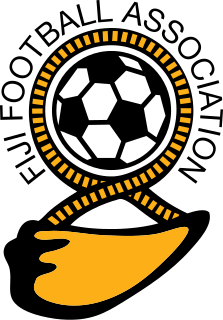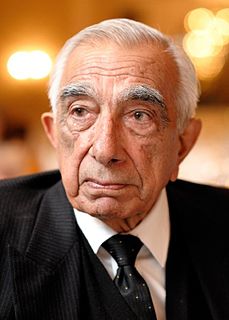Related Research Articles

The Rt. Hon. Mahendra Chaudhry is an Fijian and the leader of the Fiji Labour Party. Following a historic election in which he defeated the long-time former leader, Sitiveni Rabuka, the former trade union leader became Fiji's first Indo-Fijian Prime Minister on 19 May 1999, but exactly one year later, on 19 May 2000 he and most of his Cabinet were taken hostage by coup leader George Speight, in the Fiji coup of 2000. Unable to exercise his duties, he and his ministers were sacked by President Ratu Sir Kamisese Mara on 27 May; Mara intended to assume emergency powers himself but was himself deposed by the military leader, Commodore Frank Bainimarama. After 56 days in captivity, Chaudhry was released on 13 July and subsequently embarked on a tour of the world to rally support. He was one of the leading voices raised in opposition to the Qarase government's proposed Reconciliation and Unity Commission, which he said was just a mechanism to grant amnesty to persons guilty of coup-related offences. In January 2007 he was appointed as Minister of Finance, Sugar Reform Public Enterprise and National Planning in the interim Cabinet of Commodore Frank Bainimarama, following another coup. Chaudhry was also co-chair of the task force focusing on economic growth within the National Council for Building a Better Fiji. In August 2008, he left the government and became an outspoken critic of it.

The Fiji Labour Party (FLP) is a political party in Fiji. Most of its support is from the Indo-Fijian community, although it is officially multiracial and its first leader was an indigenous Fijian, Dr. Timoci Bavadra. The party has been elected to power twice, with Timoci Bavadra and Mahendra Chaudhry becoming prime minister in 1987 and 1999 respectively. On both occasions, the resulting government was rapidly overthrown by a coup.
Siddiq Moidin Koya (1924–1993) was a Fijian Indian politician, Statesman and Opposition leader. He succeeded to the leadership of the mostly Indo-Fijian National Federation Party (NFP) on the death of the party's founder, A. D. Patel, in October 1969, remaining in this post until 1977. He later served a second term as leader of the NFP, from 1984 to 1987.
Jai Ram Reddy, CF is an Indo-Fijian politician, who has had a distinguished career in both the legislative and judicial branches of the Fijian government. In 1998, he received Fiji's highest honour, the Companion of the Order of Fiji, in recognition of his services to his country.

The National Federation Party is a Fijian political party founded by A.D. Patel in November 1968, as a merger of the Federation Party and the National Democratic Party. Though it claimed to represent all Fiji Islanders, it was supported, in practice, almost exclusively by Indo-Fijians whose ancestors had come to Fiji, mostly as indentured labourers, between 1879 and 1916. However, in the 2018 General elections the party recorded a considerable change in its support base as a consequent of the inclusion of more indigenous Fijian candidates.
Sir Vijay Raghubar Singh, KBE was an Indo-Fijian lawyer and politician who held Cabinet office in the 1960s and 1970s. Vijay Singh served in Prime Minister Ratu Sir Kamisese Mara's government in a variety of positions, including Attorney-General, and was President of the Indian Alliance, a division of the ruling Alliance Party. He quit the party in 1979 following disagreement with Alliance leadership and later joined the opposition National Federation Party. Vijay Singh was involved in the restructure of the Fiji sugar industry and was a leading member of the Jaycees movement in Fiji.

Ambalal Dahyabhai Patel, better known as A.D. Patel, was an Indo-Fijian politician, farmers' leader and founder and leader of the National Federation Party. Patel was uncompromisingly committed to a vision of an independent Fiji, with full racial integration. He was one of the first to advocate a republic, an ideal not realized in his lifetime. He also advocated a common voters' roll and opposed the communal franchise that characterized Fijian politics.
Dr. Ahmed Ali was a Fijian academic and politician who held Cabinet office several times from the late 1970s onwards. Unlike the majority of his fellow Indo-Fijians, he was aligned with the Alliance Party of Prime Minister Ratu Sir Kamisese Mara in the 1970s and 1980s, and with the Soqosoqo Duavata ni Lewenivanua Party of Laisenia Qarase in the early 2000s. He was one of only two Indo-Fijians to agree to serve in the interim government established in the wake of two military coups carried out to assert indigenous political supremacy in 1987.
Brigadier-General Jeremaia Waqanisau OF MSD JP was a Fijian career soldier, civil servant, and diplomat, who had served since April 2004 as his country's Ambassador to China.

The Fiji Football Association is the governing body of football in Fiji. It came into existence in 1961, replacing the ethnically based Fiji Indian Football Association. The Indian Association was formed in 1938 but football in Fiji had a much humbler beginning.
The Alabama Public Service Commission, commonly called the PSC, was established by an act of the Alabama Legislature in 1915 to primarily replace the State Railroad Commission. The PSC's responsibility was expanded in 1920 to include regulating and setting rates that utility companies charge their customers for electricity. The legislature expanded the PSC's responsibilities in later years to include those companies that provide gas, water, and communications, as well as transportation common carriers such as trucking and air carriers. The PSC effectively determines the rate of profits that most of these companies are allowed to earn. However, some of its traditional responsibilities have passed to the federal government with the passage of the Federal Aviation Act of 1994 and the Federal Communications Act of 1996.

Roedad Khan is a Pakistani politician and former civil servant. He was a leading figure in Pakistan from the start to the end of the Cold War. During his long career, Khan was one of the most senior civil servants of Pakistan.
Uday Singh Commissioner of Oaths, OBE, JP, was an Indo-Fijian landowner, social worker and politician. Like his close associate Mahendra Motibhai Patel, CBE, he was a staunch supporter of former Prime Minister Ratu Mara and the former Alliance Party. The Singh family is the single largest private landowner in Fiji.
Unlike the majority of Fiji's Indian population, who are descendants of Indian indentured labourers brought to Fiji between 1879 and 1916, most of the Sikhs came to Fiji as free immigrants. Most Sikhs established themselves as farmers. Sikhs also came to Fiji as policemen, teachers and preachers. In recent years large numbers of Sikhs have emigrated from Fiji, especially to the United States, Canada, the United Kingdom, Australia and New Zealand. Sikhs in Fiji are generally referred to as Punjabis.
Fiji Teachers Union (FTU) is a union representing elementary and secondary education teachers in Fiji. It is a member of the Fiji Trades Union Congress, and Education International.
This is a synopsis of organisations formed by Indians in Fiji. When they became free from the bondage of indenture and were able to organise themselves, they founded numerous organizations to seek social and political justice. These organisations promoted the teaching of Indian languages and religious practices and also to helped others in time of need. Some of the successful organisations are listed below in order in which they were established. Some, such as the National Federation Party, are no longer exclusively Indian, but are still predominantly so.
Indian Association of Fiji has been the name used by organisations formed at different times in the history of Fiji, to unite different groups within the Fiji Indian community to work to improve the plight of Indians in Fiji.
Kallu Dhani Ram is the General Secretary of the oldest farmers union in Fiji, the Fiji Kisan Sangh. He has been one of the few people who has been involved with the Sangh since being inspired to join it by its founder, Ayodhya Prasad, in 1939. He has made valuable contribution to the sugar industry in Fiji.
Indo-Fijians or Indian Fijians, are Fiji citizens of fully or partially Indian descent, including descendants who trace their heritage from various regions of the Indian subcontinent. Although Indo-Fijians constituted a majority of Fiji's population from 1956 through the late 1980s, discrimination and the resulting brain drain resulted in them numbering 313,798 (37.6%) out of a total of 827,900 people living in Fiji as of 2007.
References
- ↑ "Ba boy comes good". Fiji Times. 9 September 2007. Retrieved 10 September 2007.